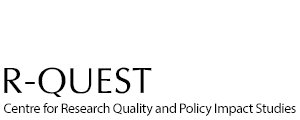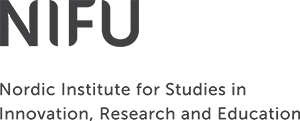Effects on society and economy
Excellence policies are often based on the assumption that research excellence does not only have a strong scientific impact defined in terms of high citation scores, but also that research excellence may be particularly instrumental in creating impacts in a wider sense. Addressing this a
assumption, R-Quest will explore how excellent researchers and research groups interact with society and create an impact in terms of i.a. innovation, industrial development, societal challenges, health, welfare and education. To what extent do research groups and individuals recognised as
excellent and world-class by scientific criteria, contribute more than others in creating societal value? Are societal and scientific impact opposed to each other or do they more often appear in combinations? What is the influence of the organization and funding of research on scientific versus societal impact? Does mission-oriented research generally have more societal relevance and impact than academic research?
The economic effects of research on society and economy have been modelled in a series of studies that show different, but relatively high returns on investment (Salter et al. 2001). It is, however, difficult to establish relevant data for the measurement of the societal impact of specific achievements in research. One problem is that individual researchers, institutions and countries most often depend on the previous or collaborating efforts of other researchers, institutions and countries as they contribute to new findings with significant impacts on society. Consequently, it is difficult to isolate the origin of research with scientific impact. Another problem is that it is difficult to trace societal impact in data on which measurement can be based. So-called altmetrics are now
proving promising methods for measuring parallels to citation impact in forms of usage, downloads and mentions of published research in social media, but these forms of social impact are still limited to written communication. Although the societal impact of research may be difficult to trace and measure, funders are increasingly asking applicants for written statements about possible specific impacts of their 11 research, both on the European level and in countries such as Denmark, Netherlands, Norway, Sweden and the United Kingdom. Such statements can be combined with other data on research performance. Furthermore, societal impact was documented in almost 7,000 evidence-based case reports for evaluation in the 2014 Research Excellence Framework of the UK. Although the data are primarily narratives, they seem to be useful for novel in-depth studies of societal impact (Khazragui; Hudson 2015). They should be useful also in relation to indicators of research quality. An institutional evaluation similar to the REF with the inclusion of documentation of societal impact was performed in 2012 at the KTH (Royal Institute of Technology 2012). This exercise gives a close-at-hand possibility for further investigating the evaluation of societal impact and research quality in combination. In contrast to other areas of research, where research is international and usually transferred to societal use by other means than the researchers’ own publications, the societal impact of research in the social sciences and humanities (SSH) can often be traced back to specific authors and their publications for wider audiences in a specific culture or society. The survey-based work of Kyvik 2005 can now be extended to a systematic study of data of registered scholarly and non-scholarly publications in the Norwegian CRIStin database since 2010. Furthermore, as academic research is often closely linked to higher education, linking the careers of students to their affiliation with research during their education represents a natural but surprisingly neglected way of tracing the impacts of research. In the R-Quest context, we will focus
on studying students affiliated with outstanding research groups and, through extensive career tracking, address the question whether high quality research is related to high quality education and successful career trajectories. With its broad portfolio of higher education studies, NIFU is particularly well equipped to carry out this line of research. In particular, this approach should provide synergetic results in combination with NIFU’s ongoing research programme on educational quality.N IFU also has access to the CORDIS database at the European Commision. It includes data on all funded and rejected projects in FP7 and Horizon 2020 with separable data for the European Research Council. A unique feature of the version at NIFU is a throughout standardization of the institutional addresses of the applicants. This means that the data can be categorized by type of funding as well as the result of the application and then compared to bibliometric performance indicators. The methodology for this type of studies has already been developed by CFA and NIFU, partly in collaboration, in several studies of the outcome of funded programmes for the Danish
Ministry of Science, Innovation and Higher Education and for the Research Council of Norway. In addition to these general options, two examples of possible particular investigations can be mentioned:
a) A study of outstanding groups (and control groups), selected by the results in evaluations
and/or by bibliometric indicators: To what extent are excellent researchers and research groups
involved in collaboration with industry, and contribute to (radical) innovations? To what extent
are they engaged in applied research and active in national and/or international research that is
targeting societal challenges?
b) A study of the impact of researchers and their institutions in references given in a systematically
selected corpus of governmental policy documents. Such a study is now possible to base on
electronic formats and text-mining techniques. Indicators of policy impact can be combined
with indicators of scientific impact.

